After reading Iqbal’s work, let it be even one of his books amongst many: one comes down to the conclusion that Iqbal was not only the epitome of an Urdu poet but also a great Philosopher, Religious reformer, political thinker, man of science, and a literary critic- Iqbal was all combined!
Here’s a journey of the world, through the lens of Iqbal.
Before we embark on this journey, it is essential to understand the age in which Allama Muhammad Iqbal lived. This was an era dominated by British colonial rule, marked by the onset and aftermath of World War I, and the decline of the Ottoman Empire. In India, where Iqbal resided, significant upheavals began to take shape. There were revolts by both Hindus and Muslims against British rule, and internal strife, as Muslims also experienced oppression within the broader struggle for independence.
Iqbal’s philosophy was profoundly shaped by these turbulent times. He was deeply influenced by the works of Rumi, whom he regarded as his spiritual mentor. Additionally, Western philosophers and poets such as Nietzsche, Goethe, and Bergson also left their mark on his thoughts, contributing to the development of his unique intellectual and spiritual outlook.
Philosophies Ruling the World & Iqbal’s take on It
This was an era when Western philosophers propagated the notion that the external world was unreal, a mere illusion, and that the Absolute Idea was the only reality. According to this philosophy, man himself was also considered unreal, disappearing into nothingness upon death, thereby rejecting the immortality of the soul.
On the other end of the spectrum, Hindu and Buddhist philosophies advocated for self-annihilation or absorption into the divine as their ultimate goal. Some sections of Muslim spiritualists supported the concept of Wahdat-ul-Wajood, which denied the individuality of the soul and posited that absorption into God was the ultimate aim of human life. This belief encouraged people to withdraw from the struggles of life and fostered a spirit of passivity and other-worldliness. As Kavi Khan notes in his article, “The recognition of Ego was nowhere to be found.” (1)
Iqbal’s philosophy asserts that God is not a mere “Idea”. He is a living personality; man is not a mere emanation from God, he has an independent identity; and this world is not an illusion, it has also a reality. Iqbal advocated that the Ego or Self, far from being a mere illusion, is the center of all reality because to know one’s self is to know God and the Universe. “I-am-ness” is thus the keynote of Iqbal’s philosophy. He says: “ Thou alone art the Reality All the rest is a mirage.” (1) Iqbal builds his case on the soul’s immortality. the ego can achieve power and strength in communion to God as He is the supreme source of all strength and power. But this is not in the form of absorption in God but rather man must communicate with God and absorb God in him.
Iqbals Khudi (EGO)
Allama Muhammad Iqbal Emphasized the concept of ego on two distinct levels:
- Individual
- Communal, Societal
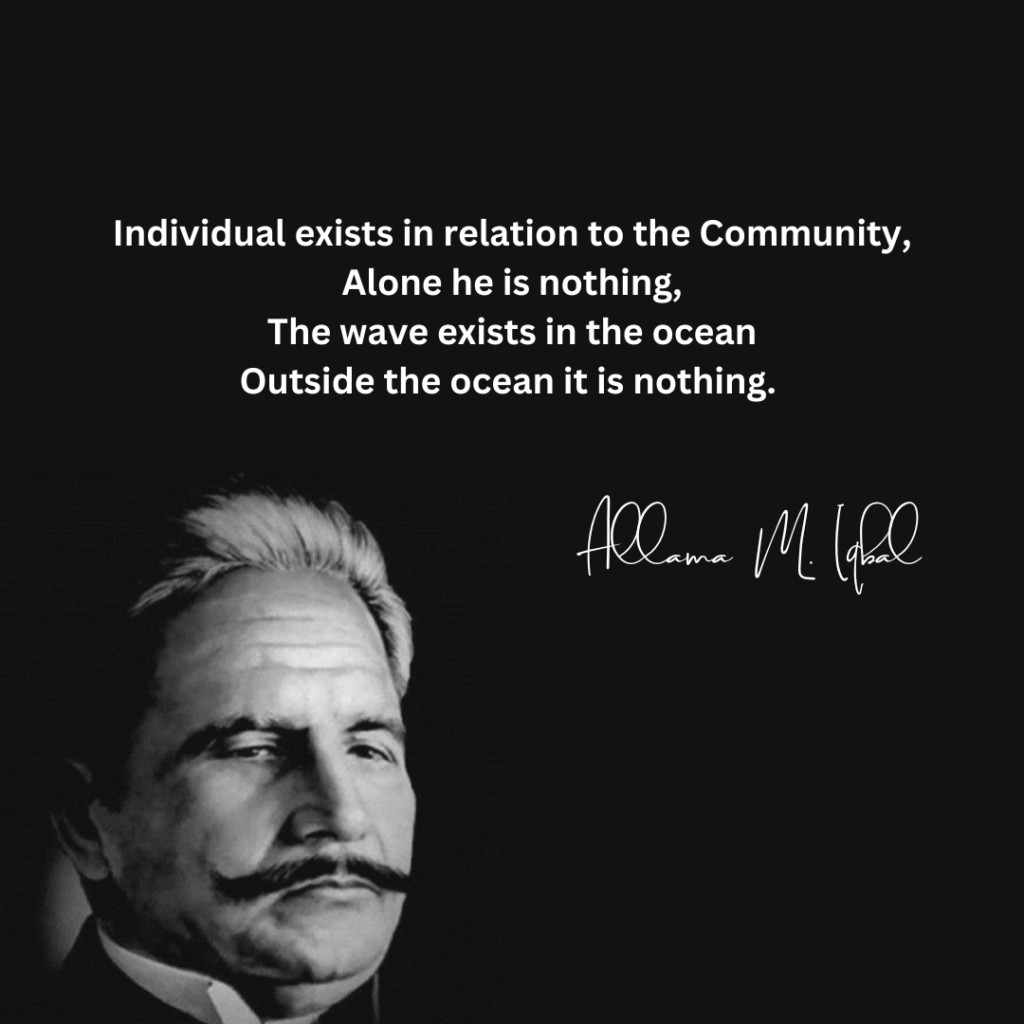
Iqbal used the term khudi to represent the ego, individuality, or self of a person. He explained khudi in two significant dimensions:
- Metaphysical Aspect: refers to the indescribable feeling of “I,” which forms the foundation of each individual’s uniqueness.
- Ethical Aspect: Khudi signifies qualities such as self-reliance, self-respect, self-confidence, self-preservation, and self-assertion when necessary for life’s interests. It also includes the power to adhere to truth, justice, and duty even in the face of death.
Iqbal’s notions of heaven and hell are intimately connected to his concept of khudi. According to him, hell represents the disintegration and dissolution of the self or ego, a state of nothingness and annihilation. In contrast, heaven is where the personality achieves a heightened sense of self-awareness, self-consciousness, and distinction. Heaven is the antithesis of nothingness; it is to be real and an essential, integral part of the Greater Reality. (2)
It is imperative to note that both aspects of khudi—the metaphysical and the ethical—build upon the foundation of Ishq (deep involvement). Ishq imparts courage to a person, enabling them to navigate life with confidence. Iqbal reminds individuals of their esteemed status as the vicegerent of God on earth. This profound involvement and passionate commitment to khudi not only fortify a person’s resolve but also reinforce their responsibility to uphold truth, justice, and duty, reflecting their divine role and purpose. (3)
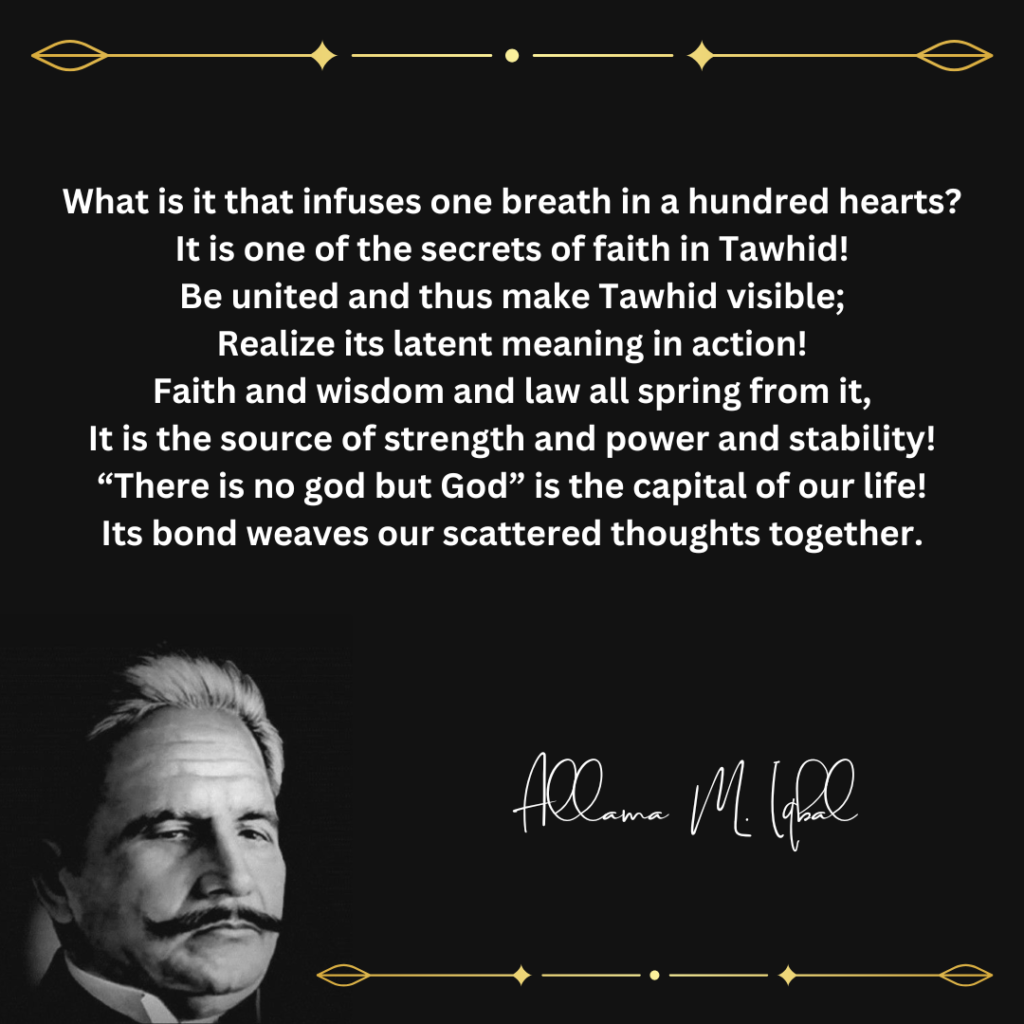
According to Iqbal, the ideal Muslim embodies the Qur’anic concept of Adam as the Khalifah, the Vicegerent of God on Earth. Iqbal argues that human freedom and creativity, particularly in ethical matters, should be guided by the Highest Good and Absolute Freedom, which is God Himself.
He acknowledges that one of the greatest challenges to the ego’s upward journey is Matter or Nature, but he doesn’t deem it inherently evil. Instead, he sees it as a facilitator, enabling the latent powers of life to unfold and develop.
Iqbal emphasizes the importance of Tawhid (Unity of God) in the Muslim faith, asserting that this principle serves as the foundation for every aspect of human life. Through firm faith in Tawhid, individuals believe in the unity and sovereignty of God, which guides their ethical decisions and actions. (4)
.
Iqbal & Freedom
For Iqbal, freedom held paramount importance across religious, social, moral, and political realms. He infused his efforts to reconstruct religious ideas with a philosophical orientation, aligning them with the historical necessities of his era.
Iqbal viewed freedom not only as a fundamental human right but also as a guiding principle essential for the advancement of society and the individual. His philosophical approach sought to harmonize religious teachings with the contemporary challenges and aspirations of his time, emphasizing the need for a dynamic reinterpretation of religious concepts to address the evolving needs of society.
In this way, Iqbal’s vision of freedom extended beyond mere individual liberties to encompass broader social, moral, and political dimensions, reflecting his commitment to the progressive transformation of human thought and society.

(Kulliyat-i-Iqbal, op. cit., pp. 662-3.)
For Iqbal, freedom is not a value or mode of human existence. It is the very life of Khudi (egohood).
Iqbal points out that the purpose of Prophet Muhammad’s mission was to infuse freedom, equality and brotherhood among all mankind. He says in his Rumuz i Bekhudi (The Mysteries of Selflessness): (5)

.
Iqbal’s Philosophy of Acquiring Knowledge of the Divine
Iqbal’s theory of knowledge integrates sense perception, reason, and intuition into a cohesive framework, blending religious and scientific perspectives. He emphasizes that intellect, devoid of love, can become destructive, leading to chaos and darkness. However, when guided by intuition and love, intellect yields profound knowledge, encompassing the essence of existence and destiny.
According to Iqbal, intuition or love serves as the law of life, enriching personality and providing vision. It corrects and enhances intellect, science, and common sense. The path to intuition, he suggests, lies through religion (Islam). Iqbal says: Intellect, if not guided by love, becomes devilish or satanic—an evil force. It generates darkness and leads the world to blind power, chaos and destruction. Unanimated by love it is dead and lifeless, and its arrow, unguided as it is, flies without aim. (Iqbal, Javid Nantah, Pp. 82-83.) Let it be quickened and guided by intuition, love, yearning, and it shall yield knowledge par excellence—good, rounded and indispensable knowledge—knowledge which is power, encompassing heaven and deriving light from the stars, which contains the description of the whole existence and to which is related the destiny of the whole of existence. Intellect infused with intuition gives celestial and divine knowledge.(6)
According to Iqbal, the journey to intuition traverses through religion. While the intuition of the self is accessible to all at a basic level as a psychological experience, attaining higher intuition—specifically, intuition of God—requires a gradual process as religious consciousness deepens.
This journey involves three stages:
- Faith: Surrendering to Divine Law without relying on reason, which aids in societal integration, self-discipline but lacks inner spiritual development. It enables man to find his niche in the set-up of political and social life. But so far as the evolution of man’s inner self is concerned it is of no consequence.
- Thought: Reason becomes the basis for religious authority, merging religion with metaphysics or philosophy.
- Discovery: the highest stage where philosophy gives place to psychology and the individual develops a yearning to attain direct contact with Divine Reality. “It is here that religion becomes a matter of assimilation of life and power; and the individual achieves a free personality, not by releasing himself from the fetters of the law, but by discovering the ultimate source of the law within the depths of his own consciousness”. (Iqbal, Reconstruction, P. 183.) (6)
.
Iqbal Stance on Knowldge
In his renowned lectures delivered in Madras, Hyderabad, and Aligarh, Iqbal extensively referenced about thirty-four Western writers, with twenty-five being his contemporaries. Notable figures such as Whitehead, Eddington, Wildoncarr, Louis Rougier, Einstein, and Nicholson were among those he gave high consideration.
Allama Iqbal’s recommendations that he addressed to the Muslims were:
- “Approach modern knowledge with a respectful but independent attitude and appreciate the teachings of Islam in the light of that knowledge, even though we may be led to differ from those who have gone before us”. (7)
- “humanity needs three things today, spiritual interpretation of the universe, spiritual emancipation of the individual, and basic principles of a universal import directing the evolution of human society on a spiritual basis.”
- It was Islam and Islam alone which, for the first time gave the message to mankind that religion was neither national and racial, nor individual and private, but purely human and that its purpose was to unite and organize mankind despite all its natural distinctions. (8)
Iqbal adds another element “ISHQ” here: Iqbal believed that behind the process of evolution is the vital impulse (Bergson’s elan vital) of ‘ishq or love which is metaphysical in nature and which makes life grow towards higher evolutionary goals. Man’s fitrah has its roots in the Divine Life and it is part of his nature to grow and evolve towards greater and greater perfection by using his creative will and power. Conservatism is as bad in religion as in any other department of human activity. It destroys the ego’s creative freedom and closes up the paths of fresh spiritual enterprise. ( Ibid. p. 145.) (10)

.In the Javid Nama God addresses human beings in this stirring call: (11)
Life is both mortal and immortal, it is all creativity and eagerness
Art thou alive? Be eager, be creative
Like us encompass the whole universe!
Shatter into pieces what is uncongenial.
Bring forth another world out of thy imagination!
It is irksome to the man who is free, to live in a world of another’s making.
He who lacks the power of creation is naught to us but an atheist and an agnostic!
He has not taken his share of our Beauty.
He has not eaten the fruit of the tree of life.
Man of truth! Be sharp and incisive like the sword and forge the destiny of they own world.
IQBAL’S VISION OF A NEW WORLD

This vision is simultaneously intellectual, ethical, religious, and humanistic.
Intellectual – it seeks to achieve a viable balance between the principles of constancy and change. This vision is grounded in a lasting foundation that ensures societal continuity while also fostering an adaptable institutional framework capable of addressing the evolving needs of society.
According to Iqbal, the rule of the second caliph of Islam, ‘Umar, represents an objectification of the ideal.
.

.
in ‘Javed Namah’, Iqbal puts the following words in Jamal-ud-Din Afghani’s mouth:
(Iqbal’s Javed Nama, (Trans. A.Q. Niaz,) Lahore, 1984, p. 102.)
.
In his New Year’s Message broadcasted from the Lahore Radio Station four months before his death, Iqbal expressed deep sorrow over the moral decline of humanity and the degradation of human values. He lamented the widespread havoc caused by imperialistic oppression, which had gripped the world.
He said: ” The tyranny of imperialism struts abroad, covering its face in the masks of Democracy, Nationalism, Communism, Fascism and heaven knows what else besides. Under these masks, in every corner of the earth, the spirit of freedom and the dignity of man are being trampled under foot in a way of which not even the darkest period of human history presents a parallel. The so-called statesmen to whom Government and leadership of men was entrusted have proved demons of bloodshed, tyranny and oppression. The rulers whose duty it was to protect and cherish those ideals which go to form a higher humanity, to prevent man’s oppression of man and to elevate the moral and intellectual level of mankind, have in their hunger for dominion and imperial possessions, shed the blood of millions and reduced millions to servitude, simply in order to pander to the greed and avarice of their own particular groups. After subjugating and establishing their dominion over weaker peoples, they have robbed them of their religions, their morals, of their cultural traditions and their literatures. Then they sowed divisions among them that they should shed one another’s blood and go to sleep under the opiate of serfdom so that the leech of imperialism might go on sucking their blood without interruption.”
.
He wrote to Syed Sulaiman Nadvi, one of the leading scholars of his times and his friend on 15th Jan. 1934: ” There is a strange struggle going on all-over the world. Democracy in dying out, and dictatorship is replacing it. Material power is being deified in Germany. A new war is being waged against capitalism. Civilization, especially in Europe, is on its deathbed. To be brief, the whole world order needs a reshuffling. Under these conditions, I would like to know to what extent, in you opinion, can Islam help to formulate a reconstruction? Kindly let me know your point of view on this topic.” (12)
.
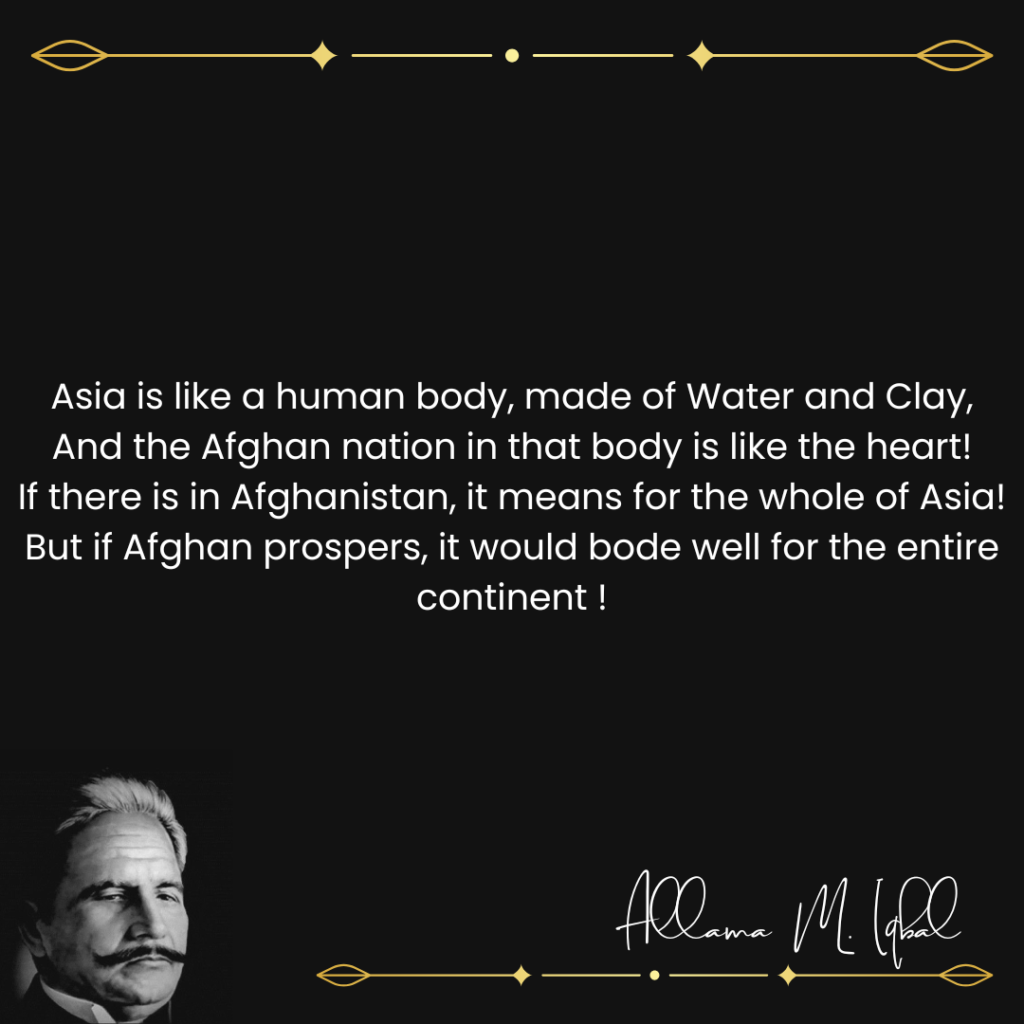
The significant challenge confronting Iqbal was the reality that the Muslim Ummah, across many regions, not only endured colonial subjugation but also grappled with a widespread moral decay.
In his view, the Afghans were a brave people, yet they lacked discipline and a centralized authority. He regarded Afghanistan as the Balkans of Asia and envisioned that a robust Afghanistan could serve as a vital source of support for Muslims in both India and Central Asia. (13)
Iqbal cautions the East against blindly emulating the West, as he believes this would lead to the loss of its own identity and essence. Instead of uncritically copying Western ways, Iqbal advocates for a thoughtful examination and evaluation of Western ideas and practices by the people of the East. (15)
Iqbal says:
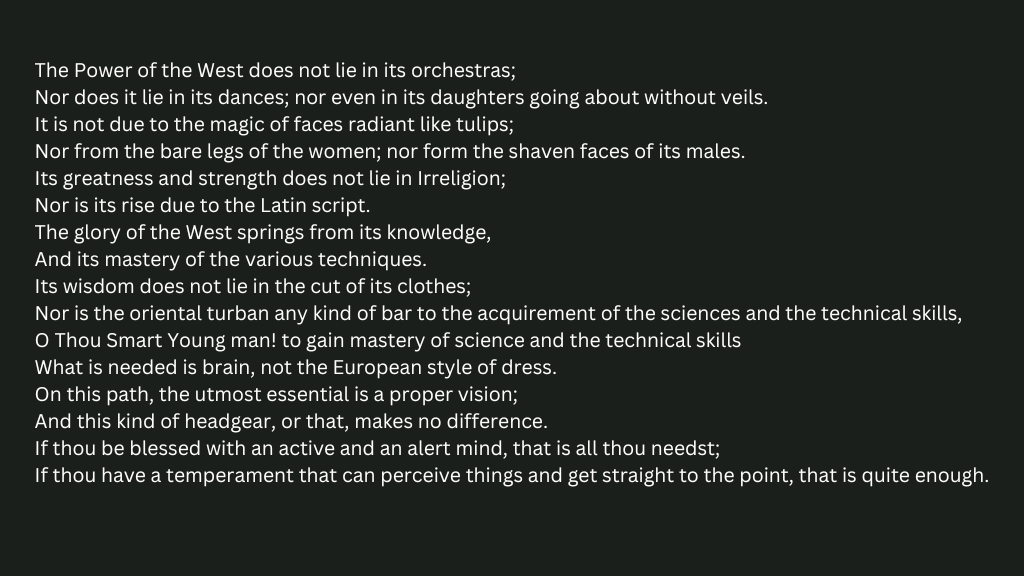
. (Iqbal’s, Javâd N«mah, pp. 282-283.)
According to Iqbal, a new world order can achieve significance and success only if it is firmly grounded in truth and justice, transcending all divisions based on ethnicity, language, or geography. According to him:
“National unity too is not a very durable force. Only one unity is dependable and that unity is brotherhood of man, which is above race, nationality, colour or language.”
The very concept of veto for the big powers is itself a partiality. Through this, UNO betrays justice. The fascinating dreams which Iqbal had about a happy and contented life and the beautiful ideals of liberty, equality and fraternity cannot possibly be materialized in any so-called New World Order which ignores the aspirations of the bigger world community and enforces itself through nuclear threat, military power and the superiority of weapons in order to safe guard certain vested interests. (14)
.
IQBAL AND THE RECONSTRUCTION OF ISLAMIC LAW
Dr. Muhammad Iqbal, on one occasion, said: “Today, Islam’s greatest need is the reconstruction of the Islamic law and its re-codification in such a way that it may provide the Islamic answer to the hundreds of thousands of new questions that have been posed by the modern economic, political, social, national and international developments.” (16)
In a letter to Maulana Sayyid Sulayman Nadvi, he wrote: “It is my firm conviction that he who critically reviews modern jurisprudence from the Qur’anic viewpoint, reconstructs it, and establishes the truth and eternality of Qur’anic laws, would be the real leader and pioneer of Islamic renaissance and the greatest benefactor of humanity at large. This is the time for action; for in my humble opinion, Islam today is on trial and never in the long range of Islamic history was it faced with such a challenge as the one that besets it today.” (17)
.
As a background check, these are the times when western education and technology was creeping into the Islamic world, where 2 reactions emerged:
- Conservatives- Those who became rigid to the old ways, rejecting any new reform or change altogether.
- Modernists- Those who thought the road to progress is in the imitation of the west.
Iqbals philosophy: Rigid with Quran & Sunnah as the primary source along with opening the doors of Ijmah and Qiyas to seek new solutions for new problems emerging of this new era.
The essence, history, situation of the arising of both western and Islamic concept is different, applying western thinking to the Islamic world will only cause confusion.

Iqbal advocates that the basic principles and rules (the Eternal principles) are immobile cannot be changed, given by the Quran and sunnah. Truth based on revelation hold true and applicable for all times.
- Quran- the cornerstone of Islamic law
- Sunnah- The real binding force of Muslim society- both these are irrefutable and non-changeable.
“each generation, guided but unhampered by the work of its predecessors, should be permitted to solve its own problems.” (Iqbal, lbid, p. 168.) But with modern problems and challenged we need modern solutions and answers.
- ijma (consensus of mujtahids on a legal notion of islam )
- Qiyas (use of analogical reasoning in legislation)- these are the instruments of growth that meet the requirements of change.

.
New problems have arisen which call for new solutions and as such the door of Ijtihad must not remain closed. As the door was kept open by God, no one had the right to permanently keep it closed. If some of the former doctors of law have upheld this view, Muslims of today are not bound by that “voluntary surrender of intellectual independence.” (18)
What does Iqbal means by the term “IJTEHAD”
Iqbal believed in independent judgement, but not so independent as to be independent of the Qur’an and Sunnah! Iqbal opposed that freedom of thought which cuts man asunder from Divine Guidance. He valued human reason but knew that it should be used within proper limits; otherwise instead of being a great asset and blessing it might turn into an evil and an instrument of destruction.

Iqbal says:
The record of the past illuminates
The conscience of a people.
The memory Of past achievements makes it self-aware;
But if that memory fades, and is forgot,
The folk again is lost in nothingness.
Know, then ‘tis the connecting thread of days
That sticks up thy life’s loose manuscript;
This self-same thread sews us a shirt to wear,
Its needle the remembrance of old yarns.
What is history, 0 Thou unaware of the self !
A fable? or a legend, a tale?
Nay, ‘tis the thing that maketh thee aware
Of thy true self, alert unto the task,
A seasoned traveller; it is the source
Of the soul’s ardour, ‘tis like the nerves to
The body of the whole community.
.

In the Reconstruction he says:
“It is the duty of the leaders of the world of Islam today to understand the real meaning of what has happened in Europe, and then to move forward with self-control and a clear insight into the ultimate
aims of Islam as a social policy.” (18)

He says: “Modern Europe has, no doubt, built idealistic systems on these lines, but experience shows that truth revealed through pure reason is incapable of bringing that fire of living conviction which personal revelation alone can bring. This is the reason why pure thought has so little influenced man, while religion has always elevated individuals, and transformed whole societies. The idealism of Europe never became a living factor in her life, and the result is a perverted ego seeking itself through mutually intolerant democracies, whose sole function is to exploit the poor in the interest of the rich. Believe me Europe today is the greatest hinderance in the way of man’s ethical advancement. The Muslim, on the other hand, is in possession of these ultimate ideas on the basis of a revelation, which speaking from the inmost depths of life, internalises its own apparent externality.”(18)
.
In conclusion, Iqbal’s philosophy needs to be revisited and revitalized, reigniting the flame he sought to kindle in his era. Now, 86 years after Iqbal, we find ourselves in the same predicament he identified. It is time to embrace his vision and make meaningful progress.
.
References
(1) Reference: (IQBAL REVIEW- Journal of the Iqbal Academy, Pakistan April 1960,Editor- Dr. Muhammad Rafi-ud-Din-page 51 Article- IQBAL: THE PHILOSOPHER-POET, written by KAVI GHULAM MUSTAFA)
(2) (IQBAL REVIEW: Journal of the Iqbal Academy, Pakistan, April 2000-EditorMuhammad Suheyl Umar, article: IQBAL’S CONCEPT OF CREATIVE EVOLUTION AND ITS RELEVANCE TO THE NEW MILLENNIUM by Ayesha Leghari)
(3) : (IQBAL REVIEW: Journal of the Iqbal Academy, Pakistan, April 2000-EditorMuhammad Suheyl Umar, article: IQBAL ON THE RECONSTRUCTION OF THE WORLD ORDER by Dr. Rafi‘ ud-Din Hashmi)
(4) ( Diw«n-â-Iqb«l L«hori (Persian Collection), Intish«r«t-i- Pag«h, Tehr«n, Ir«n, 1361 (Shamsi), pp. 126-6, (Tr. K.G. Saiyidain: Iqbal’s Educational Philosophy, Shaikh Muhammad Ashraf, Lahore, 1954, pp. 165-6).
(5) (Diw«n-i Iqb«l L«hori, op. cit., p. 140, (Tr. A.J. Arberry: The Mysteries of Selflessness, John Murray, London, 1953, pp. 21-3).
(6) (IQBAL REVIEW- Journal of the Iqbal Academy, Pakistan April 1960,Editor- Dr. Muhammad Rafi-ud-Din– Article: IQBAL’S THEORY OF KNOWLEDGE- JAMEELA KHATOON)
(7) (Allama Muhammad Iqbal, The Reconstruction of Religious Thought in Islam, Lahore, Iqbal Academy, 1989, p. 78.)
(8) (Shamloo, Speeches and Statements of Iqbal, Lahore, Al-Manar Academy, 1948. p. 226.)
(9)(Poem: Allama Muhammad Iqbal, PayAm-i-Mashriq, (reprint) Delhi, Kutub Khana Nazirea, 1962, p.12 quatrain 5 from ‘Lala-i-Tur’.)
(10) (IQBAL REVIEW: Journal of the Iqbal Academy, Pakistan, April 2000-EditorMuhammad Suheyl Umar, article: IQBAL’S CONCEPT OF CREATIVE EVOLUTION AND ITS RELEVANCE TO THE NEW MILLENNIUM by Ayesha Leghari)
(11) Reference: (IQBAL REVIEW: Journal of the Iqbal Academy, Pakistan, April 2000-EditorMuhammad Suheyl Umar, article:IQBAL AND SARTRE ON HUMAN FREEDOM AND CREATIVITY by Dr. Latif Hussain Kazmi)
(12)(Iqbal: Iqbal N«ma Vol. I, (Ed. Sheikh Ata-ullah), Lahore, 1944, p. 181. See also, Iqbal: Iqbal, Jah«n-i-Dâgar, (Ed. Muhammad Faridul Haq,) Karachi, 1983, pp. 67-71.)
(13) ( Iqbal: Letters of Iqbal, p. 93.)
(14) (IQBAL REVIEW: Journal of the Iqbal Academy, Pakistan, April 2000-EditorMuhammad Suheyl Umar, article: IQBAL ON THE RECONSTRUCTION OF THE WORLD ORDER by Dr. Rafi‘ ud-Din Hashmi)
(15)(IQBAL REVIEW: Journal of the Iqbal Academy, Pakistan, April 2000-EditorMuhammad Suheyl Umar, article: IQBAL’S VISION OF A NEW WORLD by Mustansir Mir)
(16) (Hayat-e-Anwar, p. 160, quoted A.R. Khan, Iqbal aur Mister, Gosha-i-Adab, Lahore, (1956) p. 67.)
(17) (Iqbal Namah, Ed. Shaikh Ataullah, Ashraf Publications, Lahore, Vol. I., p. 50.).
(18) Reference: (IQBAL REVIEW- Journal of the Iqbal Academy, Pakistan April 1960,Editor- Dr. Muhammad Rafi-ud-Din– Article: IQBAL AND THE RECONSTRUCTION OF ISLAMIC LAW written by KHURSHID AHMAD )
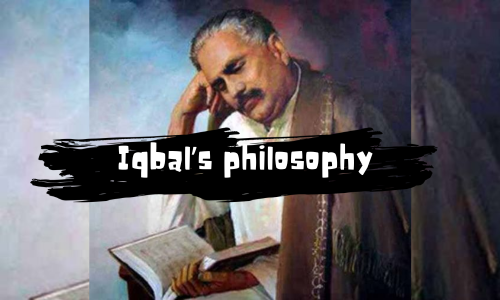

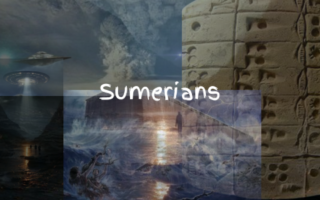
Your writing style makes this topic very engaging. I’m definitely going to share this with my friends. I appreciate the detailed information shared here. Your perspective on this topic is refreshing! Your writing style makes this topic very engaging.